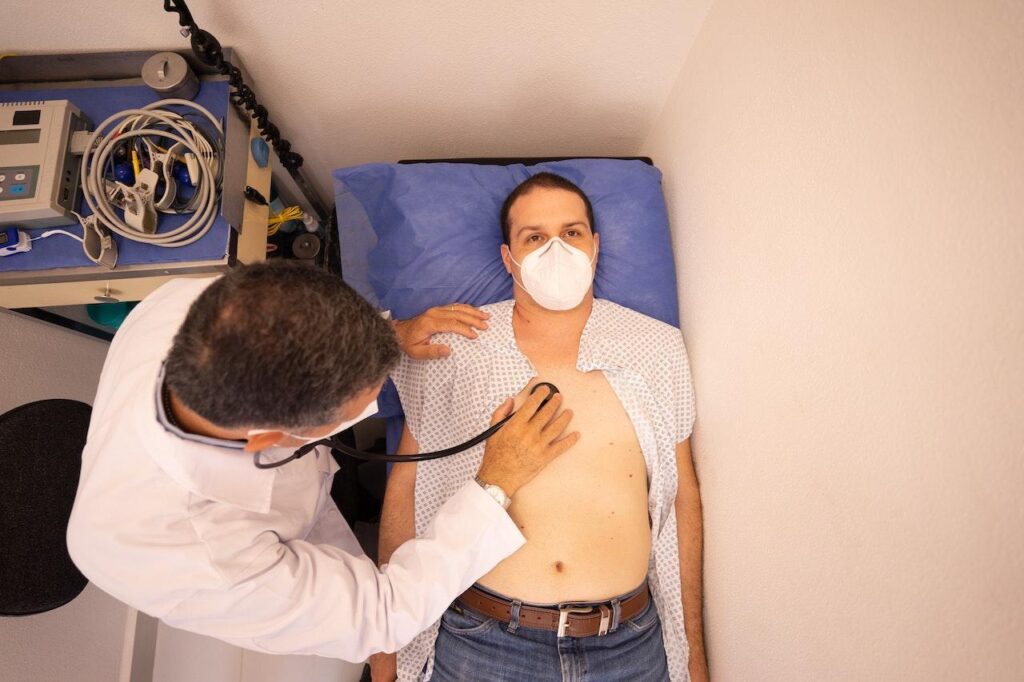by Dr. Zahid Iqbal
INTRODUCTION
Mesothelioma
Mesothelioma is a type of cancer that affects the mesothelium, a vital layer of cells that line the body’s internal organs, providing a protective barrier and facilitating physiological functions. This blog will focus on the various aspects of understanding mesothelioma. Despite being a rare form of cancer, this disease has gained notoriety due to its association with exposure to asbestos, a naturally occurring mineral that was widely utilized in various industries due to its exceptional strength, heat resistance, and durability.
Incidence of mesothelioma
According to the world health organization (WHO), 43000 deaths with this type of cancer occur worldwide in every ear. However, it is fairly rare in the USA accounting for only 3000 new cases every year.
What is the main cause of mesothelioma?
It is imperative to underscore that the majority of cases still stem from asbestos exposure, and the other causes are relatively uncommon. If you harbor concerns regarding your risk, it is advisable to consult with a medical professional for a comprehensive evaluation and guidance.

What is asbestos?
Asbestos consists of six different minerals made up of fibers and are found naturally in the environment. One of the qualities of Asbestos minerals is that they don’t dissolve in water or evaporate. They are also resistant to heat and fire and cannot be broken down easily by chemicals.
The Link between Asbestos Exposure and Mesothelioma
Asbestos was widely employed in the construction and industrial sectors until the perils of asbestos exposure became widely recognized. Inhalation of asbestos fibers can lead to their accumulation in the mesothelium, inducing irritation and inflammation that can progress to mesothelioma. The latency period between asbestos exposure and the onset of cancer can range from 20 to 50 years, making early diagnosis challenging.
Where asbestos is commercially used?
As this fiber is very strong and heat resistant, it is used in various materials. Some examples are;
- Building materials like roofing shingles, tiles, asbestos types of cement
- Friction products like automobile brakes, clutches, and auto transmission parts.
- Heat resistant fabrics
- Coating
- Gaskets
- Some packages material
- steam and hot water pipes
- furnaces and boilers
Which professionals are affected by mesothelioma?
In those professions or industries where asbestos is widely used, there are chances of contracting this tumor. These professions may include;
- Construction workers
- Industrial workers
- Power plants workers
- firefighters
These employees frequently handle asbestos-containing materials in greater volumes.

What are the other causes of Mesothelioma?
The primordial cause of mesothelioma is widely recognized to be asbestos exposure, but there exist other, less frequent sources that can trigger the emergence of this malignancy. A few such causes are outlined below:
1- Hereditary Heterogeneity:
In a minority of cases, this may stem from a genetic anomaly that is transferred intergenerationally.
2- Ionizing Irradiance:
Prolonged exposure to elevated doses of radiation, such as those experienced by certain patients undergoing radiation therapy for neoplastic conditions, may heighten the probability of onset.
3- Simian Virus 40 (SV40):
SV40 is a virus discovered in some mesothelioma tumors, and it is hypothesized that contact with polio vaccines contaminated with SV40 may elevate the risk.
4- Zeolite exposure:
Research has indicated that exposure to zeolites, naturally occurring minerals, may augment the likelihood of developing this disease.
Types of Mesothelioma
Pleural mesothelioma (mesothelioma lung cancer):
Pleural mesothelioma is a type of cancer that affects the pleura, which is the thin layer of tissue that lines the chest cavity and surrounds the lungs. It is caused by exposure to asbestos, a naturally occurring mineral that was widely used in various applications until its health risks became better understood in the latter half of the 20th century.
When asbestos fibers are inhaled, they can become lodged in the pleura and cause irritation and inflammation over time. This can eventually lead to the development of pleural mesothelioma, slow-growing cancer that can take 20-50 years or more to develop after initial asbestos exposure.
Heart or pericardial mesothelioma
Pericardial mesothelioma affects the pericardium – the sac-like sheath enveloping the heart. This disease, frequently traced to asbestos exposure, manifests as a neoplastic growth in the protective tissue layer that surrounds the heart, thereby inducing an assortment of symptoms and physiological complexities.
In the presence of symptoms suggestive of pericardial mesothelioma, it is imperative to seek the advice of a seasoned medical practitioner, as prompt and early intervention can result in improved outcomes and an augmented quality of life.
Peritoneal or abdominal mesothelioma
Peritoneal mesothelioma has deleterious effects on the peritoneum – a thin, complexly structured membrane enveloping the abdominal cavity. Symptoms, including but not limited to abdominal pain, bloating, distension, weight loss, and cachexia
Testicular mesothelioma
Testicular mesothelioma is a rare condition that affects the membrane of the testis called tunica vaginalis. It may cause swelling, pain, and a mass in the scrotum.
Symptoms of mesothelioma
Mesothelioma, a malignancy that affects the delicate membranes enveloping internal organs, may manifest through various telltale symptoms that can raise alarm. The following may be some signs and symptoms
Lungs/Respiratory symptoms:
Shortness of breath, coughing, and wheezing may signify the presence of pleural mesothelioma, impacting the lung lining. Symptoms of pleural mesothelioma may include chest pain, shortness of breath, coughing, and weight loss. The disease can also cause fluid to accumulate in the chest, a condition known as pleural effusion, which can cause additional symptoms such as difficulty breathing and chest pain.
Digestive or Abdominal symptoms:
An accumulation of fluid in the abdominal cavity may result in constipation or diarrhea, swelling, and bloating.
Weight loss:
Unexpected and rapid weight loss, along with a pervasive sense of weakness and fatigue, may be symptomatic of mesothelioma.
Fatigue:
Fatigue and a general sense of weakness may also be experienced by individuals with mesothelioma, potentially due to the physical toll that the disease can take on the body.
Night Sweats and high temperature:
some individuals with mesothelioma may experience night sweats, insomnia, and fever, which can be indicative of an underlying infection or inflammation
Pain:
Persistent discomfort in the chest or abdominal realm, compounded by physical activity or movement, may be indicative of this tumor.
DIAGNOSIS OF MESOTHELIOMA
Diagnosing Mesothelioma: Identifying Symptoms and Utilizing Diagnostic Tools
The symptoms are often non-specific and can take several decades to develop after asbestos exposure. Various methods like X-ray, CT scan and laparoscopic examination are used. A biopsy of the affected tissue is the most common diagnostic tool, with the sample examined under a microscope for evidence of cancer cells.
Stages of Mesothelioma
The progression is typically divided into four distinctive stages, which are determined by the extent of the malignancy’s dissemination. These stages are:
1. Stage 1: In this phase, the cancer is restricted to a single region, predominantly the pleural or peritoneal lining.
2. Stage 2: At this stage, cancer has expanded to neighboring tissues but has yet to infiltrate the lymphatic system.
3. Stage 3: In this phase, cancer has reached remote lymph nodes or other organs.
4. Stage 4: This stage is characterized by the widespread dissemination of cancer to multiple areas of the body, thereby marking the advanced or metastatic stage.
It’s vital to comprehend that these stages are general classifications and may not precisely depict the evolution of the disease for every patient. The stage is determined through a composite of diagnostic assessments, such as imaging scans and biopsy techniques.
Delineating the stage of mesothelioma is crucial for the selection of the most appropriate therapeutic approach and for determining the prognosis.
TREATMENT OF MESOTHELIOMA
Treatment Options for Mesothelioma:
Unfortunately, there is no cure for mesothelioma, but various treatments are available to manage its symptoms and improve outcomes for patients. Options include surgery, radiation therapy, chemotherapy, and a combination of these methods. The choice of treatment will depend on various factors, including the stage and location of the disease, the patient’s overall health, and their personal preferences.
Palliative care (Managing Symptoms and Improving Outcomes). This is the controlling of symptoms and making the life of the affected person easier.
Effectiveness of treatment
The effectiveness of treatment of each option available depends on the stages and types of mesothelioma. The experts have to decide what option they should go for treatment. Early diagnosis and treatment have better outcomes.
LEGAL AND FINANCIAL ASSISTANCE FOR MESOTHELIOMA
Lawsuit and settlement related to mesothelioma
Lawsuits and settlements related to mesothelioma are a labyrinthine topic, with a convoluted history that stretches back to the 1960s when the carcinogenic properties of asbestos first came to light.
Since then, an overwhelming variety of legal tactics have been used to pursue justice and compensation for persons who were exposed to asbestos and later discovered to have the disease, resulting in an explosion of litigation.
These lawsuits come in many shapes and forms, from personal injury claims to wrongful death claims to class action lawsuits. Each presents its legal hurdles and complexities, with multiple defendants, plaintiffs, and evidence to consider.
The defendants in mesothelioma lawsuits are a motley crew, ranging from manufacturers of asbestos-containing products to building owners, contractors, and other parties that have exposed people to asbestos. The potential liability of these defendants can be a complex web to untangle, with issues of negligence, causation, and foreseeability all coming into play.
WHAT TYPES OF COMPENSATION MAY BE AVAILABLE?
If someone diagnoses a person with mesothelioma, they may be eligible to compensate them in any of the following ways:
- Personal injury lawsuit. Suing the syndicate that exposed someone to asbestos.
- Wrongful death lawsuit. The family member may sue the company wherever their deceased loved one was exposed to asbestos.
- Veterans benefits. Someone may be eligible to have their treatments paid for if they are exposed to asbestos as a member of the armed forces.
- Asbestos trust funds. There are many trust funds made by asbestos companies that have filed for bankruptcy.
MESOTHELIOMA AWARENESS AND PREVENTION
Importance of mesothelioma awareness
It is of utmost importance to spread awareness about mesothelioma as it can significantly contribute to educating the general population. by spreading awareness about mesothelioma, it can facilitate early detection of the disease, thereby increasing the probability of efficacious treatment. Mesothelioma awareness also plays a crucial role in promoting research and development, which can ultimately lead to improved treatment options and potentially even a cure. Moreover, increasing awareness can offer support to those afflicted by the disease by providing vital information and resources while also diminishing the associated social stigma.
Tips for preventing exposure to asbestos
- discontinue work if you suspect that asbestos is not properly used in material
- use protective equipment, including a suitable face mask
- proper cleaning before eating or going home
- take proper training before starting your work where asbestos is used
- Don’t use procedures that build a lot of dust, like the use of power tools
- Don’t sweep up dust or debris
- Don’t take home overalls used for asbestos work
- Don’t reuse disposable masks
- Don’t smoke, eat or drink in the work area
MESOTHELIOMA RESEARCH
Current research and clinical trials related to mesothelioma
The mesothelioma research scene is ablaze with novel treatments and experimental clinical trials aimed at tackling this vicious form of cancer.
researchers are enthusiastically developing better ways to diagnose and treat mesothelioma earlier on, to improve the fate of patients and possibly boost their survival rates. However, it’s important to note that some of these mesmerizing treatments may not be widely accessible, so patients must have a frank discussion with their healthcare providers about what options are on the table.
The future outlook for mesothelioma treatment and prevention
It’s worth noting that while some of these treatments and approaches may be promising, they are still in the experimental stage and may not be widely available. It is vital to discuss all treatment options with a healthcare provider.
Here are a few examples of these emerging treatments, and the enigmatic complexities that surround them:
1. Immunotherapy: Immunotherapy, an innovative approach that mobilizes the immune system to fight cancer, holds great promise for patients. However, the method’s unpredictable efficacy, its labyrinthine costs, and the enigmatic nature of its side effects can make it a daunting option for patients and healthcare professionals alike.
2. Gene Therapy: Gene therapy, an experimental treatment that modifies a patient’s DNA to fight cancer, is a promising avenue of research, but it also raises complex ethical, regulatory, and practical issues. The method’s long-term safety, its accessibility and affordability, and the ethical implications of gene modification all add to the complexity and mystery of this approach.
3. Cryotherapy: a treatment that uses extreme cold to destroy cancer cells, is a tantalizing option for patients, but its complex nature and enigmatic potential have left clinicians and researchers with more questions than answers. The treatment involves using liquid nitrogen or other cooling agents to freeze cancer cells, which can lead to their destruction.
4. Phototherapy: Cutting-edge photodynamic therapy for mesothelioma may offer a tantalizing new approach to combat this elusive and deadly cancer. With its light-activated photosensitizer and potential to destroy cancer cells, photodynamic therapy has emerged as a promising and enigmatic treatment option.
5. Virotherapy: Novel therapeutic modalities encompass the innovative strategy of virotherapy to eradicate malignant cells. Preliminary research endeavors manifest auspicious results, although rigorous assessment is necessary to ascertain the soundness and effectiveness of this pioneering technique.
CONCLUSION
Mesothelioma is a serious and life-threatening disease with a definitive association with asbestos exposure. Early detection and treatment are crucial in managing its progression and improving outcomes for patients. If you have a history of asbestos exposure, it is imperative to discuss your risk with your doctor and undergo regular medical screenings to monitor your health. With increased awareness and advancements in research, we hope that one day we will find a cure and provide hope for those affected by this devastating disease.
FAQs about mesothelioma
Is mesothelioma the deadliest cancer?
Mesothelioma is considered to be one of the deadliest forms of cancer. This is because it is often not diagnosed until it has reached an advanced stage, and it can be difficult to treat due to its location in the body and the fact that it is often resistant to chemotherapy and radiation therapy.
Is there any cure for mesothelioma?
Regrettably, the present medical landscape does not offer a cure for mesothelioma. Diagnosis of this ailment often occurs at an advanced stage
What Are the Risk Factors for Mesothelioma?
Besides asbestos working industries, the following factors may also play a role;
- Age: elderly people are more likely to contract mesothelioma
- Race: white people are more prone to mesothelioma
- Sex: male are affected more than female
- Smoking: smoker are more likely to have this cancer
What can be misdiagnosed as mesothelioma?
Mesothelioma may be misdiagnosed by other commonly occurring chest diseases like pneumonia, or other lung cancers.
Similarly, peritoneal mesothelioma is misdiagnosed as other abdominal diseases. Examples include irritable bowel syndrome, and many other abdominal cancers like ovarian, pancreatic, and gastric cancers.
Can mesothelioma be found in a blood test?
Yes, various biomarkers are present in the blood. But other procedures are more authentic.
Can mesothelioma spread to the brain?
Yes but very rare.
Which is the best test for mesothelioma?
A biopsy is a more reliable test
Is mesothelioma difficult to diagnose?
Yes, sometimes multiple tests are required.
How early can mesothelioma be detected?
Usually, mesothelioma is detected very late as the symptoms may mimic other diseases. Suspicious symptoms present in the workers in the asbestos industries must seek early investigation so that they can be screened earlier.
Is mesothelioma a tumor?
Yes it is a rare cancer
What is the most common type of mesothelioma?
Pleural mesothelioma
What are the warning signs of mesothelioma?
These may include Chest pain, difficulties in respiration, early tiredness, swallowing difficulties, and hoarseness of voice. But remembers, these signs are non-specific and may be present in other diseases.
Is mesothelioma genetic?
Only 1 %
What can be done to prevent mesothelioma?
The best way is to avoid exposure to asbestos
Please also read this article
——————————————————————————————————————–
If you are health conscious, then you must check out the following amazing products
The ultimate keto plan, Negative Ions Sticker-protect your family, Smart Blood Sugar, The Essential Keto cook book, Lean Belly, Doctor’s Book of Survival Home Remedies, Custom Keto Diet, The Back Pain SOS, Cleaner Smile Teeth, The Lose Your First 10 Lbs, Nutrition Guide, Meal Planner










